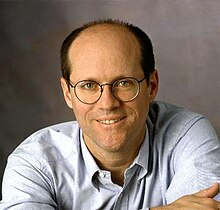Steve Kirsch
hideThis article has multiple issues. Please help or discuss these issues on the talk page. (Learn how and when to remove these template messages)
|
Steven T. Kirsch | |
|---|---|
 | |
| Born | December 24, 1956 |
| Alma mater | Massachusetts Institute of Technology |
| Known for | Inventing the optical mouse, FrameMaker, founder of Infoseek |
Steven Todd Kirsch (born December 24, 1956) is an American serial entrepreneur. He has started several companies, including Mouse Systems, Frame Technology Corp., Infoseek and OneID. He was one of two people who coincidentally invented the optical mouse.[2] In 2007, his personal fortune was estimated at $230 million, the majority earned from the IPO of Infoseek and the acquisition of Frame Technology.[1]
Career[]
Kirsch has a Bachelor of Science and a Master of Science in electrical engineering and computer science from the Massachusetts Institute of Technology.[3]
In 2003, Hillary Clinton presented Kirsch with a National Caring Award from the Caring Institute in Washington, D.C.[citation needed] In 2005 he founded Abaca, which made a spam filter (99.99% accurate according to two reviews).[4][5] Abaca was acquired by Proofpoint, Inc. in 2013.[citation needed]
On August 11, 2007, Kirsch announced on his personal Web site that he had been diagnosed with Waldenström's macroglobulinemia, a rare blood cancer.[6]
In September 2011, he started OneID[7] which is creating a user-centric Internet-scale digital identity system that uses public key cryptography to replace usernames and passwords with a single, stable, secure, digital identity that preserves privacy and is compatible with the NSTIC[8] goals.[9] The technology was used by Salsa Labs in 2013, to increase the frequency and security of online donations.[10]
In April 2020, he started the COVID-19 Early Treatment Fund (CETF) with a personal donation of $1M in order to fund COVID-19 drug repurposing research.[11]
In May 2021, Kirsch posted an article online making an unfounded claim that COVID-19 vaccines affect fertility, while also underplaying the vaccines' ability to prevent illness and death.[12] The following month, Kirsch appeared in a YouTube video posted with Bret Weinstein and Robert W. Malone to discuss COVID-19 vaccines. In the video, Kirsch makes several false claims, including that spike proteins used in COVID-19 vaccines are "very dangerous".[13][14]
References[]
- ^ Jump up to: a b Markoff, John (December 3, 2007). "Spam's End? Maybe, if Time Allows". Nytimes.com.
- ^ Sherr, Sol (2 December 2012). Input Devices. Elsevier Science. p. 221. ISBN 978-0-323-15643-1.
- ^ "Kirsch Foundation: About The Founders". Kirschfoundation.org. Retrieved July 11, 2011.
- ^ "Tolly Group Review of Abaca" (PDF). Tolly Group. Retrieved 22 September 2011.
- ^ "Spam Star" (PDF). Network Computing. Retrieved 22 September 2011.
- ^ Diana Kapp (February 22, 2011). "The one problem he can't solve". San Francisco Magazine. Retrieved January 17, 2017.
- ^ "oneid.com". oneid.com. 2012-06-14. Retrieved 2012-06-18.
- ^ "National Strategy for Trusted Identities in Cyberspace". Nist.gov. Retrieved 2012-06-18.
- ^ Hardy, Quentin (2011-11-03). "OneID Aims to Unite Devices to Fight Hackers". The New York Times. Retrieved 3 November 2011.
- ^ "Salsa Labs Launches Quick Donate". Salsa Labs. Retrieved 26 August 2014.
- ^ "COVID-19 Early Treatment Fund". treatearly.org. 2020-04-14. Retrieved 2020-12-22.
- ^ Teoh, Flora (June 24, 2021). "COVID-19 vaccines don't affect ovaries or fertility in general; the vaccines are highly effective at preventing illness and death". Health Feedback. Retrieved August 10, 2021.
- ^ Reuters Fact Check (June 18, 2021). "Fact Check-COVID-19 vaccines are not 'cytotoxic'". Thomson Reuters. Reuters. Archived from the original on June 18, 2021. Retrieved August 11, 2021.
- ^ "No sign that the COVID-19 vaccines' spike protein is toxic or 'cytotoxic'". PolitiFact. June 16, 2021. Retrieved August 10, 2021.
External links[]
- 1956 births
- Living people
- American computer businesspeople
- 20th-century American inventors
- 21st-century American inventors
- American philanthropists
- Human–computer interaction
- American technology company founders
- MIT School of Engineering alumni
- Businesspeople from Los Angeles
- Henry Crown Fellows